|
|
|
Sort Order |
|
|
|
Items / Page
|
|
|
|
|
|
|
| Srl | Item |
| 1 |
ID:
113288
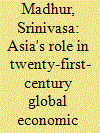

|
|
|
|
|
| Publication |
2012.
|
| Summary/Abstract |
The basic foundations of today's framework for global economic governance were laid in the years following the Second World War. Reflecting the balance of economic power at the time, Asia did not play a major role in either designing the institutional architecture or setting the agenda for global economic governance. In more recent decades the centre of gravity of the global economy has shifted towards Asia, and this trend is likely to continue in the decades to come. Asia's growing economic weight enhances its potential to play a much stronger role in shaping twenty-first-century global economic governance. Realization of that potential will, however, depend upon how successfully Asia addresses five key challenges: rebalancing sources of growth; strengthening national governance; institutionalizing regional integration; providing political leadership; and adopting the global lingua franca-English. While the Asian policy-makers' ambition to play a bigger role in global economic governance is growing, their appetite for addressing the necessary policy challenges is not necessarily keeping pace with that growing ambition. This gap between ambition and action will need to be gradually closed-only then can Asia help itself in playing a bigger role in global economic governance.
|
|
|
|
|
|
|
|
|
|
|
|
|
|
|
|
| 2 |
ID:
152425
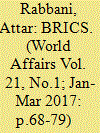

|
|
|
|
|
| Summary/Abstract |
Challenging projections about the growth and influence of BRICS, Attar Rabbani argues that instead of rivalling the G-7, BRICS could become a distant memory if growth figures decline within member nations. Geopolitics, entrenched structural complexities together with confliting interests would pull apart the constituent units of the conclave sooner rather than later.
|
|
|
|
|
|
|
|
|
|
|
|
|
|
|
|
| 3 |
ID:
112813
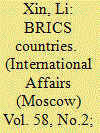

|
|
|
|
|
| Publication |
2012.
|
| Summary/Abstract |
THE MAN WHO COINED the acronym BRIC probably did not even imagine that it would later be filled with real content and would acquire viability. Indeed, the nations that became part of this association are located at the most different points of the planet - in Asia, Africa, Europe, and Latin America. Nevertheless, the development of the economic structures of the BRICS countries has brought about a diversification of the world economy and global market, previously focused mainly on the U.S. and Western countries. In the process of the reform of global economic governance, these countries stand on similar ground; they strengthen coordination of actions and cooperate with each other. These countries are at similar stages of development and tackle approximately the same tasks: economic growth, internal stability and social development. Their advantage lies in the fact that their economies are complementary, which provides a broad field for cooperation within the scope of one organization and with the rest of the world. It is safe to say that the BRICS countries are active supporters and practitioners of global partnership for development and a bridge for North-South dialogue and cooperation
|
|
|
|
|
|
|
|
|
|
|
|
|
|
|
|
| 4 |
ID:
125265


|
|
|
|
|
| Publication |
2013.
|
| Summary/Abstract |
BRICS (Brazil, Russia, India, China and South Africa) has developed into a vibrant co-operation mechanism. The New Delhi declaration of fourth BRICS summit reflects the evolution of a common vision and maturing relationship among member states in the current international system. The co-operation among BRICS nations is a reflection on the development of international situation as well as the desire and choice of emerging economies. The establishment of BRICS Development Bank is a crucial announcement for serving the development needs and aspirations of the emerging and developing world.
|
|
|
|
|
|
|
|
|
|
|
|
|
|
|
|
| 5 |
ID:
177664
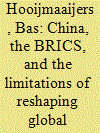

|
|
|
|
|
| Summary/Abstract |
Cooperation between Brazil, Russia, India, China and South Africa (BRICS) has increased since the first BRIC (Brazil, Russia, India and China) meeting in 2006. We have witnessed the establishment of various BRICS institutions, including the New Development Bank and the Contingent Reserve Arrangement. Because of its politico-economic weight, China exerts great weight on the BRICS exceeding that of its partners. Additionally, Beijing has pursued its own initiatives including the Belt and Road Initiative (BRI), and the Asian Infrastructure Investment Bank, with for instance the BRI having created frictions with other BRICS members including India. This article examines how and why China and the BRICS are reshaping global economic governance, and to what degree the BRICS and BRICS institutions represent anything new. More importantly, it analyzes China’s use of the BRICS to reshape global economic governance, and the potential for its independent initiatives to undermine the BRICS’ impact on global economic governance. It shows that the dynamics of the BRICS limit their potential of reshaping global economic governance. What is critical is the domestic political economy and interests of China, India and the other BRICS countries that all hold different positions and preferences in the international system.
|
|
|
|
|
|
|
|
|
|
|
|
|
|
|
|
| 6 |
ID:
175855
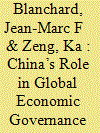

|
|
|
|
|
| Summary/Abstract |
A large proportion of debates about China’s impacts on global economic governance lack systematic empirical analysis. We engage the debate about if China is a revolutionary, revisionist, or status quo state through a deep dive into China’s behaviors with respect to Bilateral Investment Treaties (BITs). This research strategy is à propos because BITs represent the de facto regime governing foreign direct investment (FDI) globally, and China is the world’s second largest signatory of BITs. Drawing upon a database that we created using material on BITs available from the United Nations Conference on Trade and Development, we systematically examine the substantive and procedural provisions of China’s BITs from 2000 onward. Using a qualitative methodology discussed in-depth in our article, we also put China’s BIT practices in comparative perspective by comparing them against the BIT practices of Japan, a leading developed economy with BIT practices reflecting those of other established economies. Our multivariate analysis demonstrates China is not a revolutionary or dramatically revisionist player with respect to BITs. It champions positions that are neither hyper-conservative (state friendly) nor hyper-liberal (FDI friendly). To be more precise, China’s policies, especially with respect to substantive provisions, tend to be conservative, with, to some extent, some liberal aspects. Our analysis, then, indicates that commentators, businesspeople, and policymakers should be cautious about proffering claims that China is dramatically reshaping global economic governance. Aside from this important contribution to the debate, our work also expands knowledge about China’s BITs specifically and BITs generally, which does not reflect adequate attention to BITs from East Asian countries.
|
|
|
|
|
|
|
|
|
|
|
|
|
|
|
|
| 7 |
ID:
163261
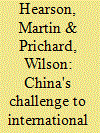

|
|
|
|
|
| Summary/Abstract |
Twentieth century institutions of global economic governance face a profound challenge adapting to the rise of emerging markets and, especially, China's rise. This is especially the case for the international tax regime, whose institutional home is the OECD and which is based on norms that favour capital exporting states. To understand the nature of the challenge posed by China, we focus on the country's engagement with a foundational norm of the international tax regime: the arm's length principle. We show that China's approach to tax cooperation is characterized by a set of apparent contradictions: conciliatory language hides an assault on the arm's length principle; a rhetoric of common cause with developing countries is contradicted by actions that maximize only China's own share of the tax ‘pie’; and a willingness to court the OECD based on the leverage gained from flirtation with outside options. In these respects, China increasingly appears to be using its market power to seek special privileges within international regimes, in ways that mirror the historical actions of the United States
|
|
|
|
|
|
|
|
|
|
|
|
|
|
|
|
| 8 |
ID:
164829
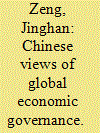

|
|
|
|
|
| Summary/Abstract |
China’s rise and America’s global retreat have made China’s role in global governance more important than ever before. By analysing Chinese (mainly academic) literature, this article studies contemporary Chinese views of global economic governance. It finds that the 2008 financial crisis is a notable point of the Chinese discourse. In addition, dialogue platforms – the G20 in particular – rather than key institutions of global economic governance such as International Monetary Fund (IMF), World Bank and Word Trade Organization (WTO) win overwhelming attention in the Chinese discourse. Chinese views of global economic governance also highly value the role of the state, while paying less attention to Non Governmental Organisations (NGO) and civil society. Overall, this article highlights a diverse, shifting and sometimes contradictory Chinese discourse on global economic governance, which helps to develop a more accurate understanding of China’s ambition in global economic governance.
|
|
|
|
|
|
|
|
|
|
|
|
|
|
|
|
| 9 |
ID:
167804
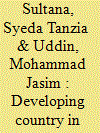

|
|
|
|
|
| Summary/Abstract |
Since the end of World War II, Bretton Woods system remains in the midst of Global Economic Governance (GEG). International Monetary Fund (IMF) was created to regulate monetary policy, International Bank for Reconstruction and Development (IBRD), then World Bank (WB) was formed to look into financial aid and lending, and General Agreement on Tariffs and Trade (GATT), then World Trade Organization (WTO) was established to regulate trade. These institutions are yet to provide much space for effective participation of developing states and are dominated by developed world like United States (US), European Union (EU), etc. Hence, a vital target of Goal 16 of Sustainable Development Goals (SDGs) is to broaden and strengthen the participation of developing states in global governance institutions. Global financial crisis and economic rise of China and India have resulted in large-scale participation of developing states in global economic governance. Being a developing country, Bangladesh will be benefitted and able to broaden its participation from exercising practices of China and India in the institutions of global economic governance.
|
|
|
|
|
|
|
|
|
|
|
|
|
|
|
|
| 10 |
ID:
090292
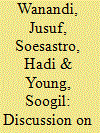

|
|
|
| 11 |
ID:
145879
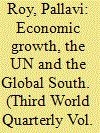

|
|
|
|
|
| Summary/Abstract |
The most visible success of the UN system has been to foster a multilateral structure of international governance that has proved resilient since World War II. However, this structure has failed to provide a financing mechanism to help developing countries achieve the structural transformations required for broad-based economic growth. Indeed, the Global South has also had many chances to reorder the international financing system but has failed thus far to do so. The global distribution of power remains with the USA and the West; even rising China plays by the contract-enforcement rules of the North in terms of global economic governance. Another critical reason why financing has not been readily available, despite the magnitude of capital flows between developed and developing economies, is that it comes with conditions that induce little ‘effort’ to result in capability development. Policies should be devised to overcome this weakness but they are unlikely within a multilateral framework. However, if the USA and China agree to work together on alternative multilateral systems promoted by the Global South, the potential for positive change increases.
|
|
|
|
|
|
|
|
|
|
|
|
|
|
|
|
| 12 |
ID:
136048


|
|
|
|
|
| Summary/Abstract |
Since the outset, in the aftermath of World War II, the United Nations development system (unds) has constituted an essential pillar of the world organisation’s activities, along with those devoted to peacekeeping, humanitarianism, human rights and justice. Adaptations notwithstanding, serious questions remain about its effectiveness and capacity to represent adequately the aspirations of ‘we, the peoples’ – the opening words of the UN Charter – particularly in the global South. Although developing countries have joined forces at different stages in the international arena – including through the Non-Aligned Movement (nam) and the Group of 77 (G77) – to increase their voices within the system, over the past decade a new twist has been added, the visibility of emerging powers. This reality not only reflects the latter’s growing role as providers of development cooperation but also their criticism of the existing architecture for global economic governance.
|
|
|
|
|
|
|
|
|
|
|
|
|
|
|
|
| 13 |
ID:
112088


|
|
|
|
|
| Publication |
2012.
|
| Summary/Abstract |
While the economic rise of new powers, frequently identified as the 'BRICs' (Brazil, Russia, India, and China), has been dramatic, the implications of this emerging multipolarity for global economic governance are not clear. In this paper, we address the question: can the diffusion of power among a greater diversity of countries result in the creation of a new global economic order-a Pax Mosaica-to succeed the Pax Americana of the previous century? Our argument proceeds in four steps. First, we provide a brief overview of the achievements and limitations of the system that was established at the end of World War II, and lasted for over half a century in the form of Pax Americana. In the second section, we investigate the emergence of multipolarity, and highlight the opportunities and costs that this generates. In the third section, we explore the routes whereby the changing balance of power might be harnessed towards the creation of a Pax Mosaica. We do so by posing four sets of questions, which must be answered if the mosaic distribution of power is to lead to greater economic stability, growth, and peace. The fourth section concludes the paper with ideas for reform with reference to the World Trade Organization, the Bretton Woods institutions, and the G20.
|
|
|
|
|
|
|
|
|
|
|
|
|
|
|
|
| 14 |
ID:
152949
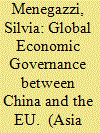

|
|
|
|
|
| Summary/Abstract |
The recent establishment of the Asian Infrastructure Investment Bank (AIIB), the initiative launched by the People’s Republic of China in 2013 underpins Beijing’s intensions to promote its own narrative about global economic governance (GEG) as well as China’s readiness to play a far more proactive role at the international level. In the age of global power shifting and with 14 EU member-states part of the AIIB, the European Union (EU) necessitates to engage further with China, in particular, within the context of multilateral institutions. This article analyses the impact of China’s evolving global governance policies on the EU. China’s and EU’s approaches to the reform of global governance present both differences and similarities, yet, the article highlights EU’s needs to make sense to what extent China’s growing ascent in the realm of global governance is reshaping world’s regional and global architectures vis-à-vis financial multilateral cooperation.
|
|
|
|
|
|
|
|
|
|
|
|
|
|
|
|
| 15 |
ID:
128321
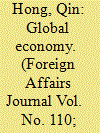

|
|
|
|
|
| Publication |
2013.
|
| Summary/Abstract |
The year 2013 continues to witness profound and complex changes in the international economic landscape. The underlying impact of the international financial crisis remains, and the recovery of the global economy is unstable, unsustainable and uneven. China has maintained steady economic growth through vigorous reform, and actively participated in global economic governance, making important contribution to global growth.
|
|
|
|
|
|
|
|
|
|
|
|
|
|
|
|
| 16 |
ID:
120479
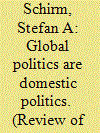

|
|
|
|
|
| Publication |
2013.
|
| Summary/Abstract |
Since 2008, the leaders of industrialised and emerging economies have engaged in steering the global economy through the G20. Divergent national positions were to be expected based upon the different stages of economic development and according to previously existing international groups. The actual controversies in the G20 did not reflect these patterns, however, but showed divergence both between industrialised countries and between emerging economies. In explaining this puzzle, I argue that the driving forces for global economic governance have ceased to be industrialised or emerging countries' alliances and levels of development. Rather, the causes for the positions of G20 members can be found in economic interests and ideas dominant in the domestic politics of countries. These societal influences shape governmental preference formation in both industrialised and emerging countries and consequently influence their behaviour in global governance. The resulting divergences weaken previously existing groups such as the G7 and the BRICs, and create a new pattern in world politics. This societal approach to explaining governmental positions in global economic governance is exemplified on the core G20 issues of stimulus/public debt and global imbalances/exchange rates.
|
|
|
|
|
|
|
|
|
|
|
|
|
|
|
|
| 17 |
ID:
147628
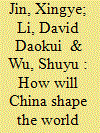

|
|
|
|
|
| Summary/Abstract |
We will provide an outlook for China's role in the world economy over the coming decades, an exercise which would not be possible without an analysis of the prospects for China's continued economic growth. Based on international and historical comparisons, we argue that today's China meets all three key conditions for continued economic growth, including a stable government that is supportive of a market economy; high and increasing quality of human capital, and openness to developed economies. Dependent on China's continued growth, we explore how China will impact many other economies through trade and investment, creating winners and losers in the world economy. Moreover, we argue that China will become a more active player in changing global economic governance not only through participating in reforms of existing institutions but also by leading efforts to establish new ones.
|
|
|
|
|
|
|
|
|
|
|
|
|
|
|
|
| 18 |
ID:
127056
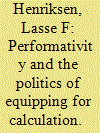

|
|
|
|
|
| Publication |
2013.
|
| Summary/Abstract |
This article argues that the concept of performativity deepens our understanding of contemporary, expertise-driven processes of global economic governance. Tracing the World Bank's role in constructing a global market for microfinance, the paper suggests that the World Bank was instrumental in translating selected parts of economic models into practice, thereby changing microfinance practices globally. Socio-technical networks centered on the World Bank were created to equip actors to become part of a global market, which incorporated not only donors but also commercial investors. The paper makes a critical intervention in the performativity literature by arguing for the need to take positional power and dominance in the socio-technical networks of International Organizations more seriously. This move improves our ability to specify how economic ideas and models are translated into practice in transnational arenas.
|
|
|
|
|
|
|
|
|
|
|
|
|
|
|
|
| 19 |
ID:
096359
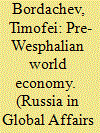

|
|
|
| 20 |
ID:
162015
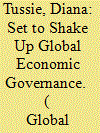

|
|
|
|
|
|
|
|